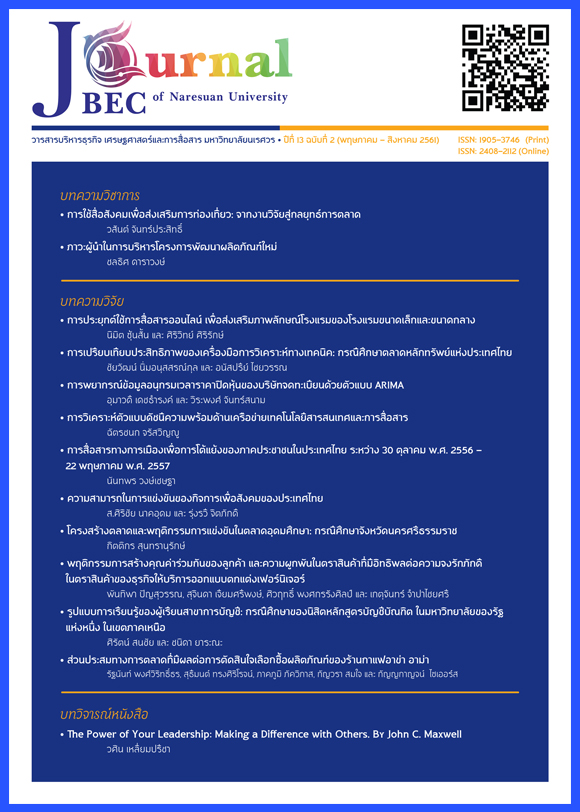ภาวะผู้นำในการบริหารโครงการพัฒนาผลิตภัณฑ์ใหม่ [Leadership in Managing New Product Development Projects]
Main Article Content
บทคัดย่อ
ภาวะผู้นำของผู้จัดการโครงการผลิตภัณฑ์มีบทบาทสำคัญอย่างมากต่อการบริหารงานของทีมพัฒนาผลิตภัณฑ์ในการสร้างความสำเร็จของโครงการ อย่างไรก็ตาม ทีมงานประเภทนี้จะประกอบด้วยสมาชิกที่เป็นตัวแทนจากหน่วยงานต่าง ๆ ได้แก่ ฝ่ายบริหาร ฝ่ายการตลาด ฝ่ายวิจัยและพัฒนา ฝ่ายวิศวกรรม ฝ่ายผลิต และฝ่ายควบคุมคุณภาพ ซึ่งมีลักษณะการทำงานที่แตกต่างกันและได้รับมอบหมายงานให้มาทำงานร่วมกันตลอดกระบวนการพัฒนาผลิตภัณฑ์ นอกจากนี้ สมาชิกทุกคนต้องอาศัยความร่วมมือระหว่างกันอย่างต่อเนื่องและอาจเกิดความขัดแย้งได้ตลอดเวลา ดังนั้น การบริหารงานทีมงานประเภทนี้จึงเป็นความท้าทายและอาจเป็นภาวะวิกฤตขององค์กร
บทความนี้มีวัตถุประสงค์เพื่อสร้างความเข้าใจเกี่ยวกับลักษณะของภาวะผู้นำในรูปแบบต่าง ๆ ได้แก่ ภาวะผู้นำเชิงการเปลี่ยนแปลง เชิงการแลกเปลี่ยน และเชิงเสรี รวมถึงผลของภาวะผู้นำทั้ง 3 รูปแบบนี้ที่มีต่อการปฏิบัติงานของทีมพัฒนาผลิตภัณฑ์ใหม่ โดยมีรากฐานมาจากทฤษฎีตามสถานการณ์ซึ่งอธิบายไว้ว่าสถานการณ์หนึ่ง ๆ ย่อมต้องการผู้นำที่มีลักษณะที่แตกต่างกันออกไป ซึ่งเนื้อหาจากบทความนี้จะเป็นประโยชน์ทางวิชาการสำหรับนักวิจัยเพื่อใช้เป็นแนวทางในการศึกษาคุณสมบัติของผู้นำประเภทต่าง ๆ ที่จำเป็นต่อโครงการผลิตภัณฑ์ใหม่ อีกทั้งยังมีประโยชน์ต่อนักปฏิบัติซึ่งได้แก่ผู้บริหารระดับสูงขององค์กรในการพัฒนาศักยภาพของภาวะผู้นำให้แก่ผู้จัดการโครงการผลิตภัณฑ์ใหม่เพื่อให้สามารถบริหารทีมพัฒนาผลิตภัณฑ์ให้ปฏิบัติงานร่วมกันอย่างราบรื่นและมีประสิทธิผลสูงสุด
Article Details
References
2. Avolio, B. J., Zhu, W., Koh, W. and Bhatia, P. (2004). Transformational leadership and organizational commitment: Mediating role of psychological empowerment and moderating role of structural distance. Journal of Organizational Behavior, 25(8), 951-968
3. Bass, B. M. (1990a). Bass and Stogdill’s handbook of leadership: Theory, research and managerial applications. New York: Free Press.
4. Bass, B. M. (1990b). From transactional to transformational leadership: Learning to share the vision. Organizational Dynamics, 18(3), 19-31.
5. Bass, B. M. and Avolio, B. J. (1990). The implications of transactional and transformational leadership for individual, team and organizational development. In R. W. Woodman and W. A Pasmor. (Eds.), Research in organizational change and development (Vol.4, pp. 231-272). CT: JAI Press.
6. Bass, B. M., Avolio, B. J., Jung, D. I. and Berson, Y. (2003). Predicting unit performance by assessing transformational and transactional leadership. Journal of Applied Psychology, 88(2), 207-218.
7. Braun, S., Peus, C., Weisweiler, S. and Frey, D. (2013). Transformational leadership, job satisfaction and team performance: A multilevel mediation model of trust. The Leadership Quarterly, 24(1), 270-283.
8. Chaudhry, A. Q. and Javed, H. (2012). Impact of transactional and laissez faire leadership style on motivation. International Journal of Business and Social Science, 3(7), 258-264.
9. Clarke, S. (2013). Safety leadership: A meta-analytic review of transformational and transactional leadership styles as antecedents of safety behaviours. Journal of Occupational and Organizational Psychology, 86(1), 22-49.
10. Darawong, C. (2016). Managing conflict between engineers/R&D and marketers in new product development process. Executive Journal, 36(1), 3-13.
11. Darawong, C. (2017). Enhancing dynamic capability of new product development teams in responding to shifting business environment. Journal of Business, Economics and Communications, 12(1), 22-31.
12. Dewar, R. D. and Dutton, J. E. (1986). The adoption of radical and incremental innovations: An empirical analysis. Management Science, 32(11), 1422-1433.
13. Ettlie, J. E., Bridges W. P. and OKeefe, R. D. (1984). Organization strategy and structural differences for radical versus incremental innovation. Management Science, 30(6), 682-695.
14. Fiedler, F. E. (1967). A theory of effective leadership effectiveness. New York: McGraw–Hill.
15. Garcia-Morales, V. J., Jimenez-Barrionuevo, M. M. and Gutierrez-Gutierrez, L. (2012). Transformational leadership influence on organizational performance through organizational learning and innovation. Journal of Business Research, 65(7), 1040-1050.
16. Gellis, Z. D. (2001). Social work perceptions of transformational and transactional leadership in health care. Social Work Research, 25(1), 17-25.
17. Gillespie, N. A. and Mann, L. (2004). Transformational leadership and shared values: The building blocks of trust. Journal of Managerial Psychology, 19(6), 588-607.
18. Grant, A. M. (2012). Leading with meaning: Beneficiary contact, prosocial impact and the performance effects of transformational leadership. Academy of Management Journal, 55(2), 458-476.
19. Lee, P. K. C., Cheng, T. C. E. and Yeung, A. C. L. (2011). An empirical study of transformational leadership, team performance and service quality in retail banks. Omega, 39(6), 690-701.
20. Liu, J., Siu, O. L. and Shi, K. (2010). Transformational leadership and employee well-being: The mediating role of trust in the leader and self-efficacy. Applied Psychology, 59(3), 454-479.
21. Nguyen, H. N. and Mohamed, S. (2011). Leadership behaviors, organizational culture and knowledge management practices: An empirical investigation. Journal of Management Development, 30(2), 206-224.
22. Nielsen, K. and Daniels, K. (2012). Does shared and differentiated transformational leadership predict followers' working conditions and well-being?. Leadership Quarterly, 23(3), 383-397.
23. Pieterse, A. N., Knippenberg, D. V., Schippers, M. and Stam, D. (2009). Transformational and transactional leadership and innovative behavior: The moderating role of psychological empowerment. Journal of Organizational Behavior, 31(4), 609-623.
24. Saeed, T., Almas, S., Anis-ul-Haq, M. and Niazi, G. (2014). Leadership styles: Relationship with conflict management styles. Internatinal Journal of Conflict Management, 25(3), 214-225.
25. Sheng, S., Zhou, K. Z. and Lessassy, L. (2013). NPD speed VS. innovativeness: The contingent impact of institutional and market environments. Journal of Business Research, 66(11), 2355-2362.
26. Skogstad, A., Einarsen, S., Torsheim, T., Aasland, M. S. and Hetland, H. (2007). The destructiveness of laissez-faire leadership behavior. Journal of Occupational Health Psychology, 12(1), 80-92.
27. Spinelli, R. J. (2006). The applicability of Bass's model of transformational, transactional and laissez-faire leadership in the hospital administrative environment. Hospital Topics, 84(2), 11-18.
28. Sun, W., Xu, A. and Shang, Y. (2014). Transformational leadership, team climate and team performance within the NPD team: Evidence from China. Asia Pacific Journal of Management, 31(1), 127-147.
29. Sungphaya, C. and Srisopa, Y. (2016). Transformational leadership of school administrators effected on the efficiency of working as a team of teachers under the jurisdiction of secondary educational service area office 9. Journal of Silpakorn Research, 8(2), 318-333.
30. Unger, D. and Eppinger, S. (2010). Improving product development process design: A method for managing information flows, risks and iterations. Journal of Engineering Design, 22(10), 1-11.
32. Wang, G., Oh, I.-S., Courtright, S. H. and Colbert, A. E. (2011). Transformational leadership and performance across criteria and levels: A meta-analytic review of 25 years of research. Group and Organization Management, 36(2), 223-270.
33. Zhang, X., Cao, Q. and Tjosvold, D. (2011). Linking transformational leadership and team performance: A conflict management approach. Journal of Management Studies, 48(7), 1586-1611.

